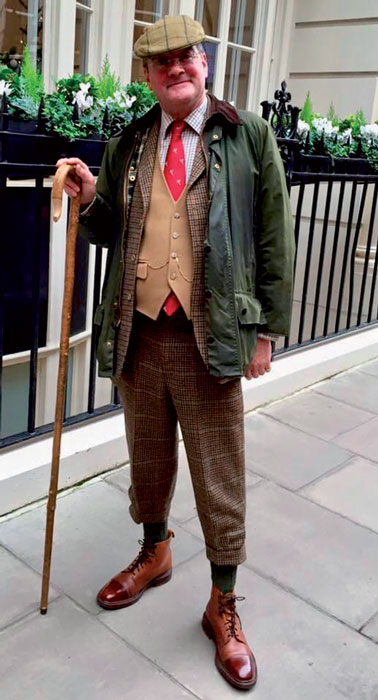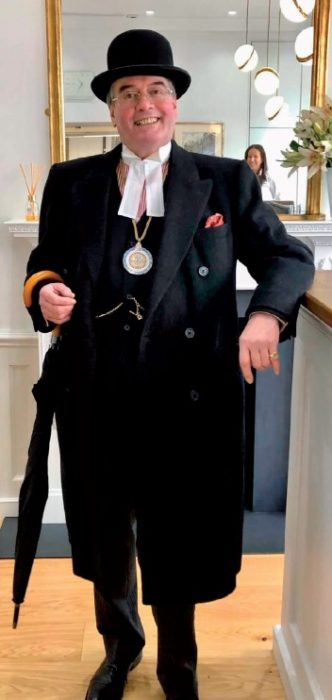David Bolton made a bigger imprint on the imagination of Fleet Street than many a man who walked its ways for longer.
Effervescent, erudite, eccentric, he was renowned in every one of the local watering holes he supped in. Which is to say them all, at one time or another. He knew and retold the stories hidden behind each corner and stamped into every cobble of EC4. He imbibed the genius loci, the spirit of the place, as if the ghosts of Johnson and Pepys, of generations of hacks and lawyers, were woven into his well-tailored shoulders. Central to this mythology for 2,000 years is the church in which we now appropriately celebrate David’s sheer love of living.
I first set eyes upon him sitting over there behind the choir stalls. He was dressed as if he had just stepped off a grouse moor. Plus fours, weighed down by extravagant tweed, and carrying one of the many hats he wore at a singular, jaunty angle. It was about a dozen years ago and he had returned to St Bride’s, which he had first visited as a law student in London in the 1970s. He soon became a fixture of the place, as shop volunteer, tour guide (a job he loved), verger and Guildsman. He was at the heart of everything that happened here until his sudden illness last year robbed him in the mid-late summer of life.
I’ll tell you something: no-one loved a memorial service more than David. ‘Wonderful memorial service on Monday,’ he’d tell me. ‘The lovely Joanna Lumley was there – read Philip Larkin. She gave me a kiss. We had a nice chat. Lady So-and-so – the Dowager – was also there. She was carrying a little dog in her handbag, would you believe it? Drinks at the Humble Grape. The wine was flowing. I stopped off on the way back at the Old Bell, caught up with a dear old friend, then on to the Cheshire Cheese, a couple of pints there. Back home at 11. A glass or two of port. Wonderful day.’
That memory captures one of the essential things about David, the item I remember most: the fun. The mischief. The twinkle in his eye.
Regulars at St Bride’s – and non-regulars – will recall how his smiling face was the customary welcome here over recent years, escorting the congregation to their seats. One reader at a memorial service, however, was unwilling to follow David’s seat recommendation. ‘Must I sit here?’ asked the obstreperous reader. To which David replied: ‘When in Rome…’ The reader snapped back: ‘What was that?’ David: ‘I said: ‘Feel at home!’
Another time, one Thursday morning, James Irving, who runs the office here, received a text: ‘Just on to the third bottle of Burgundy at El Vino. See you at midday for the staff meeting.’
James fondly remembers another pure David moment. Said James: ‘I’ve been doing dry January this year, David. Have you ever tried anything similar?’ David: ‘Well, there was a week in August 1984.’
There was a lot more that went into the making of David Bolton than a camel’s thirst. He was simply the most knowledgeable man I ever met. It is impossible even to sketch the limits of his learning. History fascinated him, of course. Churches and cathedrals were crucially important. Just mention Durham and off he would go on St Cuthbert and the Venerable Bede and barrel vaults and decorative arcading. Like the old Football League he divided all England’s cathedrals into four divisions, the exact order of which he could recite off the top of his head. Incidentally, Lincoln he rated highest. St Alban’s was close. Gloucester, his beloved home Cathedral, was his specialist subject when he appeared on BBC’s Mastermind. His general knowledge round was less impressive. ‘The half-time refreshments in the green room were rather too good,’ he owned up.
He knew just as much about virtually every parish church, however obscure. Other star subjects included the Church, with a capital ‘C’ – its star clerics and its dubious – architecture, music, stately homes, kings and queens, Roman Britain or Roman Rome – everything that Lord Clark called ‘Civilisation’, and much more, to current affairs, Stilton cheese, English bitter, French wine, vintage port, Jermyn Street shirtmakers, Welsh rugby and beyond. His mind was inexhaustibly inquisitive and his memory for dates and names and quotes and battles retentive verging on the ridiculous.
The Bloomsbury flat in which he spent the last two decades of his life, most of it with his much-missed partner Sandra, was a living museum. It must have contained the largest collection of books outside the British Library. Actually, north of 5,000 at a conservative estimate. Old Penguins, the full Pevsner collection and duplicates, Haynes manuals, Ordnance Survey maps, the list goes on. No book was ever wasted in David’s hands. Or discarded or forgotten. They were all living, enduringly turned to and loved. An inveterate hoarder, he kept his old microscope – in its box – his Latin homework, postcards from his father, cards from his then infant sons and the pipes he started smoking as a 15-year-old.
And to the final part of this tribute. His clothes. He liked a bit of swank and ceremony and a stiff collar, for sure. His collection of suits at the time of his death numbered 70, in stripes of every width. Seventy shoes or boots. Thirty blazers, including boating jackets and his superb smoking jacket. Sixty-plus hats, including a family heirloom silk top hat with which he was especially pleased. Two dozen canes and umbrellas. Corduroys of every hue of burgundy and mustard. Prints on every inch of wall – 200 minimum.
The place should have been preserved by the National Trust. If he had been a junior cabinet minister it would have been.
David was interested in everyone and everything. Although a Telegraph reader he took delight in where I had been on Daily Mail service and what I had written, however mundane the subject or leaden the prose. He had bought the paper and devoured it and would recount it to me. He was a man of substantial faith, never happier than to be of service, particularly, it must be said, when, as verger, selecting the Communion wine. His research ethic in this endeavour was unrelentingly professional. (He almost bankrupted the church with his choices!) He was old-fashioned in a courteous and chivalrous and charming sense rather than a reactionary. For he was an Englishman, as Gilbert and Sullivan would have it, but it was ‘greatly to his credit’ that he was never a narrow one. He was humorous and witty and worldly. He was proud of his family. He delighted in his bank of knowledge, managing to regale us with his recollection of this north transept or that without ever lecturing us or bragging to us. He was thrilled to have been associated with St Bride’s and the Guild. He drank deeply from the well of life.
As Oscar Wilde, whom he was apt to quote, said: ‘To live is the rarest thing in the world. Most people exist, that’s all.’
Our dear friend David lived, indeed. And, better, with his joie de vivre he not only lit up occasions; he enriched lives.




